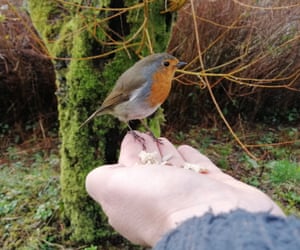It landed with the lightest of pressure, toes thin as fuse wire splayed on my outstretched fingers. With eyes closed, one might have mistaken the weight for the touch of falling raindrops.
There, on my upturned hand, a robin – my friendly garden robin. Dark pupils watched me as it tucked in to the seed mix on my palm, picking sunflower kernels from the pile one at a time.
It was in no hurry. In the past I have hand-fed robins that grab and dash, but this one steps forward to the centre of my palm and calmly eats its fill before heading off.
Back in December this individual made itself known as I topped up the bird table, perching on the wooden slats almost as soon as I laid out dawn offerings. I felt sure I could forge a closer bond. By nature, robins shadow animals that disturb the soil and expose invertebrates – whether wild boar or gardeners – so are one of our most approachable birds.

It took a fortnight to win its confidence. At first I rested my hand next to the seed as it fed on the table. Once it became used to this, I filled my palm with titbits, from which it snatched the odd morsel. Finally, the only food to be had was that which I held out – and following a few nervous flypasts, it plucked up courage and alighted.
Now this bold little companion waits for me to come, and is on my hand and eating within seconds, its chest as bright as a segment of clementine, its back a warm brown.
Although the sexes look alike and both sing through the winter, it is the males that become lead vocalists during the breeding season. Now spring is here, I feel certain mine is a male as he floods the air with rich refrains.
One morning he paused while feeding to listen to a distant rival, puffed up his chest in territorial defiance and burst into song. Throat quivering, cascades of sweet notes poured from his gaping beak, my fingers his songpost.
It was worth all the daily deliveries for this special honour – the enchanting moment a wild bird sang from my hand.